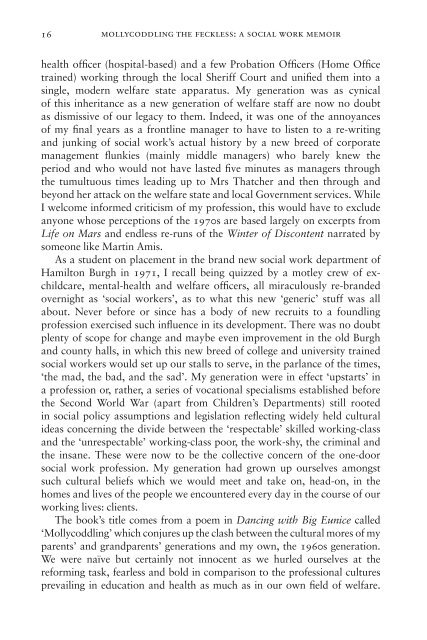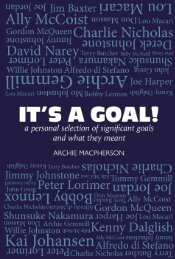Mollycoddling the Feckless by Alistair Findlay sample
My mother, ninety-three, blames me and my kind for mollycoddling the feckless. Alistair Findlay has written the first ever memoir of a career in Scottish social work. He reflects on the changing landscape of the profession since he entered it in 1970 in a memoir that is thoughtful, progressive, humane – and funny. He conveys how he and his fellow workers shared friendship and banter in work that can be hard and thankless but also hugely rewarding and worthwhile.
My mother, ninety-three,
blames me and my kind
for mollycoddling the feckless.
Alistair Findlay has written the first ever memoir of a career in Scottish social work. He reflects on the changing landscape of the profession since he entered it in 1970 in a memoir that is thoughtful, progressive, humane – and funny. He conveys how he and his fellow workers shared friendship and banter in work that can be hard and thankless but also hugely rewarding and worthwhile.
Create successful ePaper yourself
Turn your PDF publications into a flip-book with our unique Google optimized e-Paper software.
16 mollycoddling <strong>the</strong> feckless: a social work memoir<br />
health officer (hospital-based) and a few Probation Officers (Home Office<br />
trained) working through <strong>the</strong> local Sheriff Court and unified <strong>the</strong>m into a<br />
single, modern welfare state apparatus. My generation was as cynical<br />
of this inheritance as a new generation of welfare staff are now no doubt<br />
as dismissive of our legacy to <strong>the</strong>m. Indeed, it was one of <strong>the</strong> annoyances<br />
of my final years as a frontline manager to have to listen to a re-writing<br />
and junking of social work’s actual history <strong>by</strong> a new breed of corporate<br />
management flunkies (mainly middle managers) who barely knew <strong>the</strong><br />
period and who would not have lasted five minutes as managers through<br />
<strong>the</strong> tumultuous times leading up to Mrs Thatcher and <strong>the</strong>n through and<br />
beyond her attack on <strong>the</strong> welfare state and local Government services. While<br />
I welcome informed criticism of my profession, this would have to exclude<br />
anyone whose perceptions of <strong>the</strong> 1970s are based largely on excerpts from<br />
Life on Mars and endless re-runs of <strong>the</strong> Winter of Discontent narrated <strong>by</strong><br />
someone like Martin Amis.<br />
As a student on placement in <strong>the</strong> brand new social work department of<br />
Hamilton Burgh in 1971, I recall being quizzed <strong>by</strong> a motley crew of exchildcare,<br />
mental-health and welfare officers, all miraculously re-branded<br />
overnight as ‘social workers’, as to what this new ‘generic’ stuff was all<br />
about. Never before or since has a body of new recruits to a foundling<br />
profession exercised such influence in its development. There was no doubt<br />
plenty of scope for change and maybe even improvement in <strong>the</strong> old Burgh<br />
and county halls, in which this new breed of college and university trained<br />
social workers would set up our stalls to serve, in <strong>the</strong> parlance of <strong>the</strong> times,<br />
‘<strong>the</strong> mad, <strong>the</strong> bad, and <strong>the</strong> sad’. My generation were in effect ‘upstarts’ in<br />
a profession or, ra<strong>the</strong>r, a series of vocational specialisms established before<br />
<strong>the</strong> Second World War (apart from Children’s Departments) still rooted<br />
in social policy assumptions and legislation reflecting widely held cultural<br />
ideas concerning <strong>the</strong> divide between <strong>the</strong> ‘respectable’ skilled working-class<br />
and <strong>the</strong> ‘unrespectable’ working-class poor, <strong>the</strong> work-shy, <strong>the</strong> criminal and<br />
<strong>the</strong> insane. These were now to be <strong>the</strong> collective concern of <strong>the</strong> one-door<br />
social work profession. My generation had grown up ourselves amongst<br />
such cultural beliefs which we would meet and take on, head-on, in <strong>the</strong><br />
homes and lives of <strong>the</strong> people we encountered every day in <strong>the</strong> course of our<br />
working lives: clients.<br />
The book’s title comes from a poem in Dancing with Big Eunice called<br />
‘<strong>Mollycoddling</strong>’ which conjures up <strong>the</strong> clash between <strong>the</strong> cultural mores of my<br />
parents’ and grandparents’ generations and my own, <strong>the</strong> 1960s generation.<br />
We were naïve but certainly not innocent as we hurled ourselves at <strong>the</strong><br />
reforming task, fearless and bold in comparison to <strong>the</strong> professional cultures<br />
prevailing in education and health as much as in our own field of welfare.


















